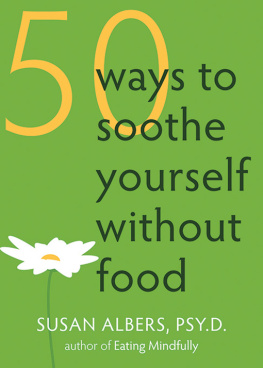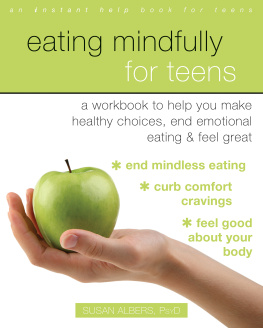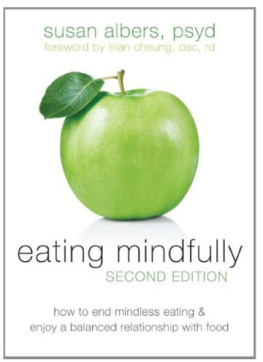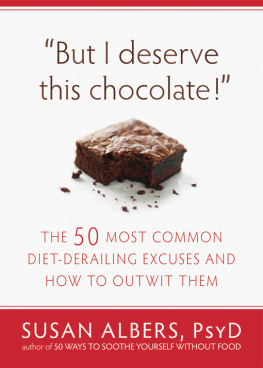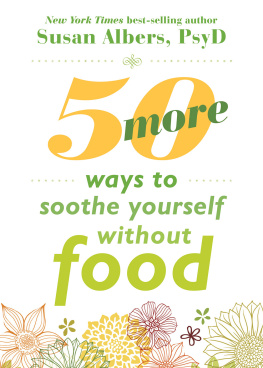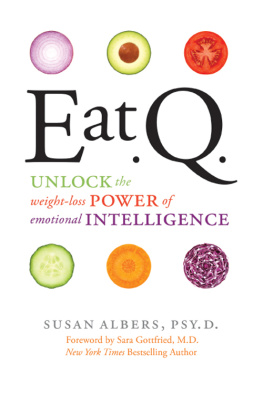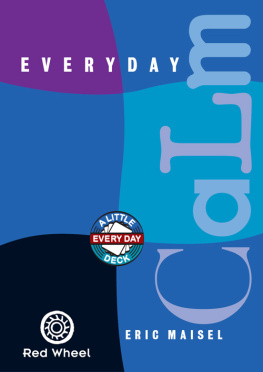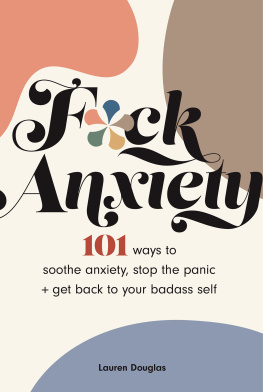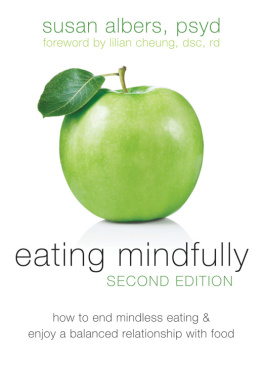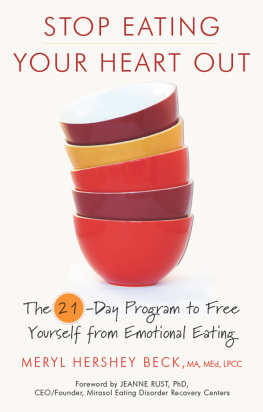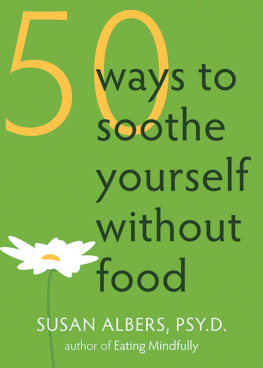acknowledgments
As always, I must thank my clients, readers of the Eating Mindfully series, and friends who generously shared their strategies and tips for soothing themselves without food. Their stories always inspire me to keep working on finding ways to help ease the suffering caused by eating problems. It is my sincere hope that you will gain some useful strategies for comforting and nurturing yourself from reading this book.
My gratitude to the people who soothe me best: John Bowling, Brooklyn Bowling, Dr. Victoria Gould, Jane Lindquist Lesniewski, Betsy Beyer Swope, Dr. Jason Greif, Eric Lingenfelter, Dr. Angela Albers, Linda Serotta, Carmela and Dr. Thomas Albers, and John, Rhonda, and Jim Bowling.
This book would not be possible without the editors and staff at New Harbinger Publications. A special thank you to Catharine Sutker and Kayla Sussell.
Susan Albers, Psy.D., is a licensed clinical psychologist at the Cleveland Clinic Hospital, where she specializes in eating issues, weight loss, body image concerns, and mindfulness. She graduated from the University of Denver, completed an internship at the University of Notre Dame, and was a post-doctoral fellow at Stanford University. Albers is author of Eating Mindfully, Mindful Eating 101, and Eat, Drink, and Be Mindful. She is an America Online diet and fitness coach. Albers work has been quoted in O, The Oprah Magazine, Family Circle, Self, and the Wall Street Journal, and she conducts mindful eating workshops internationally. Visit Albers online at www.sootheyourselfwithoutfood.com.
Contents
Publishers Note
This publication is designed to provide accurate and authoritative information in regard to the subject matter covered. It is sold with the understanding that the publisher is not engaged in rendering psychological, financial, legal, or other professional services. If expert assistance or counseling is needed, the services of a competent professional should be sought.
Distributed in Canada by Raincoast Books
Copyright 2009 by Susan Albers
New Harbinger Publications, Inc.
5674 Shattuck Avenue
Oakland, CA 94609
www.newharbinger.com
Cover design by Amy Shoup; Cover illustration by Sara Christian;
Text design by Amy Shoup and Michele Waters-Kermes;
Acquired by Catharine Sutker; Edited by Kayla Sussell
All Rights Reserved
Epub ISBN: 978-1-60882-118-1
The Library of Congress has cataloged the print edition as:
Albers, Susan, Psy.D.
50 ways to soothe yourself without food / Susan Albers.
p. cm.
Includes bibliographical references.
ISBN-13: 978-1-57224-676-8 (pbk. : alk. paper)
ISBN-10: 1-57224-676-6 (pbk. : alk. paper) 1. Compulsive eating. 2. Food habits--Psychological aspects. 3. Meditation--Therapeutic use. I. Title. II. Title: Fifty ways to soothe yourself without food.
RC552.C65A43 2009
616.8526--dc22
2009023473

To Brookie,
May you be blessed with patience and fortitude.
introduction
On days like today, I could eat everything that isnt nailed down. I find myself sneaking into the kitchen after getting both kids to bed. I rummage through the refrigerator for something to eat. I justify my nibbling by telling myself that after such a hard day, I deserve something satisfying. Munching makes me feel good. Its instant bliss. I forget about all my chores and stress. And after all the leftovers are gone, I still feel like I need something else. So I open up a box of cookies. I cant stop eating them until I am way passed stuffed. Why does eating feel so good in the moment, and then I feel so much worse than when I started?
Rachel
Does this sound familiar? When Rachel needs comfort, she needs it now! A nagging boss, demanding kids, and never-ending housework all seem to vanish for a momentjust as long as she is eating. Munching on potato chips provides a seductive moment of calming and soothing. But just a few minutes after she swallows the last morsel, the soothing effect vanishes and she is filled with regret and guilt. Rachels relationship with food sums up the way most emotional eaters feel, sometimes on a daily basis. Eating has an amazingly contradictory power. It can relax and calm your nerves, while at the same time, it can drive you crazy.
When you eat to soothe yourself, it is generally what most of us call stress eating or emotional eating. These terms describe the times you eat specifically to calm down, numb out, or elevate, prolong, lessen, or avoid your feelings. Notice, however, that emotional eating and stress eating are different. Stress eating means consuming food in response to feeling overwhelmed or upset. Emotional eating includes eating done not to relieve hunger, but in response to any kind of feeling, even pleasant ones like joy and surprise. Yes, its true. Even good feelings can lead to overeating. Sometimes you eat because it makes you feel good and you dont want that feeling to stop. In Rachels case, just about any kind of demand on her time prompted her to eat for emotional reasons.
Rachels emotional eating was becoming a problem. The same cycle was repeating over and over again. Stress. Need comfort. Need to eat. Feel relief. Feel good. Positive feeling fades. Feel guilt. Need soothing. More stress about guilt and weight gain. Begin cycle again. Although eating provided a temporary emotional patch, the major downside was that she was gaining weight. She hated stepping on the scale, because every time she weighed herself the numbers seemed to go up. It didnt matter whether she was experiencing a major or a minor stress. Each time she felt stressed, she went straight to food for a quick pick-me-up. Rachel couldnt understand why she continually sought food for comfort when it caused her so much distress about her weight. It just didnt make sense.
This book explains why people like Racheland like youfall into the trap of eating to soothe yourselves. It covers some of the reasons that make emotional eating so seductive and comforting. As you read, youll be taking a closer look at your emotional eating for the purpose of conquering it. Youll also learn some practical solutions.
Essentially, if you eliminate eating as your main source of comfort, you have to find something helpful to put in its place. In this book, there are over fifty tips and techniques for doing just that. The initial techniques and tips are based on the concept of mindfulness, which is a clinically sound way to calm and soothe both your body and your mind. You will also learn mindful coping skills that will help you to better regulate your emotions. To put it simply, mindfulness is the state of awareness. When you are truly aware of what you are feeling and approach your feelings with a nonjudgmental attitude, you can find healthy ways to deal with whatever kind of discomfort you might be trying to numb out with food. Say good-bye to comfort foods and hello to using your mind and body to cope with emotional eating.
my background
As you read this book, youll notice that I refer to the clients I work with in my psychotherapy practice. I am a clinical psychologist who was trained at the University of Denver and completed a postdoctoral fellowship at Stanford University. Over the last ten years, I have focused on treating clients who are struggling with dieting, body image, anorexia, bulimia, and binge-eating disorder. Many of the examples that I use in this book are adapted from my clients experiences and stories.
the mystery of emotional eating

